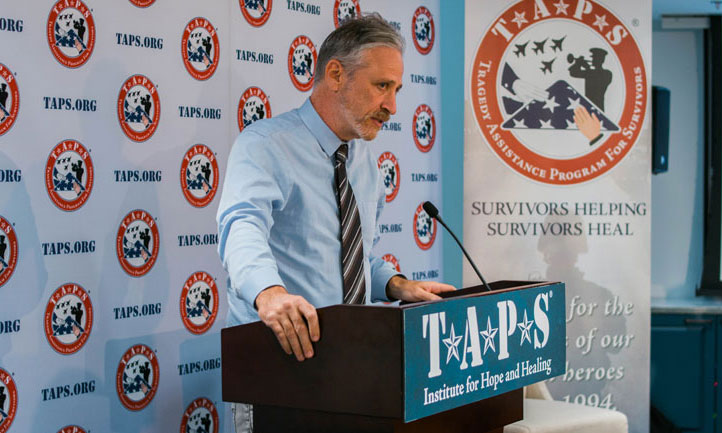The TAPS Interview: Jon Stewart
Author: Allison Gilbert
Jon Stewart’s father, a veteran of the Korean War, died in 2013. But the former Daily Show host’s personal experience with loss is not the only reason he sat down recently for an interview with TAPS Magazine. Stewart was in Arlington, VA, for the launch of the TAPS Institute for Hope and Healing®.

Stewart is a staunch supporter of service members, veterans, and military families. He is also a tireless advocate for first responders and is credited with being a driving force behind the passage, in Congress, of the James Zadroga 9/11 Health and Compensation Act. This legislation provides health care and financial support for 9/11 first responders, who breathed in toxic dust and smoke during the massive cleanup at Ground Zero. According to John Feal, founder of the FealGood Foundation, more than 7,000 first responders have developed cancer (as certified by the government), and nearly 2,000 have died.
Stewart has spoken at military events, visited with troops overseas, and advocated for the care of those who have served and suffered. He talked with Allison Gilbert, a member of the TAPS Advisory Board, as well as with reporters from WTOP radio and Connecting Vets, about the significance of the new Institute. Below is an edited compilation of those discussions.
TAPS: Why have you chosen to speak so openly about grief and resilience?
Stewart: Grief is really isolating when it occurs. Unfortunately, when people go through tough times, many choose not to reach out for help or don’t know what to do. There’s so much confusion. Individuals may even wonder if they’re grieving the “right” way, which doesn’t exist. And while everybody experiences loss, too few know how to grieve so they can hold tight to their loved one’s memory while making the best of the time they still have in front of them. This is a field in which TAPS has an incredible wealth of experience and compassion.
TAPS: What inspired you to lend your voice to the launch of the TAPS Institute for Hope and Healing?
Stewart: I’d become aware of TAPS through work I’d done with the USO and military families at Walter Reed Army Medical Center and Fisher House Foundation. Yet even among those communities, there is a separate area for military families who have experienced loss. Grief is still really tough for people to think about. And Bonnie Carroll, to her great credit, used her loss as a springboard to be there for others who are in that same situation. It’s incredible what she’s been able to build.
TAPS: I’m sure you receive requests to support many charities. Why first responders and the military?
Stewart: I’m drawn to supporting people who give of themselves so selflessly. It’s an unusual individual who actually moves toward trouble rather than away from it.
I’m also struck by the stoicism within these communities. Members of the military and their families often don’t reach out for help when they need it. We depend on them, and yet when the time comes for them to depend on us, too often we’re not there for them. So I try to help push along the idea that the least we can do for them is repay their service and selflessness with support.
TAPS: Is there a TAPS program that speaks to you the most?
Stewart: The Good Grief Camp military mentor program. I think this initiative is especially important for the children left behind—for them to see someone who is like their dad or like their mom, who is in the military, who understands what they’re going through. There are things most people don’t even think about. For example, if a loved one is lost during service and the family lived on a base, that family doesn’t get to live on that base anymore. As isolating as grief can be, that can be even more traumatic. So for TAPS to come in and provide a softer landing for people and a way to move forward is just amazing.
TAPS: Is there ever a wrong time to laugh about loss?
Stewart: Everyone deals with loss differently. Laughing is how I deal with it. So for me, for my family, no. We will probably be joking in the midst of a death, during that moment. But everybody is different, and that’s what’s so great about the TAPS Institute for Hope and Healing: It supports a process that tells people, “Hey, there is no right or wrong way to do this. There’s no time frame. Embrace who you are. You’ll get through it that way. ”
From the pen of...
Allison Gilbert, a professional speaker, workshop leader, and writer, serves on the TAPS Advisory Board. She is the author of three books on grief and loss, Always Too Soon, Parentless Parents, and, most recently, Passed and Present: Keeping Memories of Loved Ones Alive.
